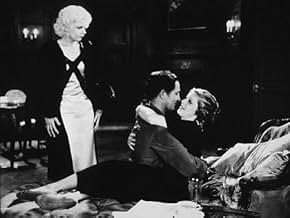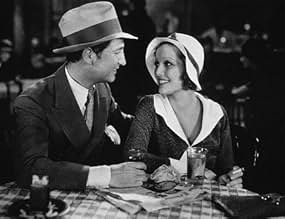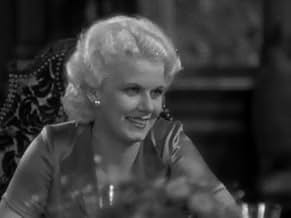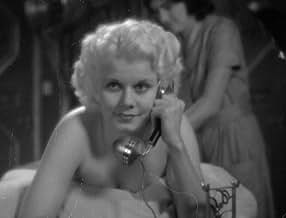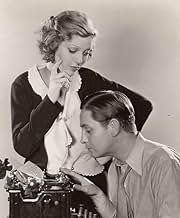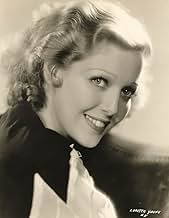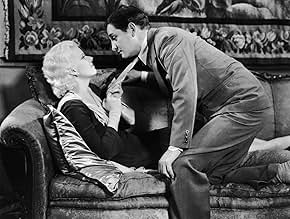PUNTUACIÓN EN IMDb
6,7/10
3,9 mil
TU PUNTUACIÓN
Añade un argumento en tu idiomaA young woman from a very rich family impulsively marries a reporter, but each assumes the other is the one whose lifestyle must change.A young woman from a very rich family impulsively marries a reporter, but each assumes the other is the one whose lifestyle must change.A young woman from a very rich family impulsively marries a reporter, but each assumes the other is the one whose lifestyle must change.
- Dirección
- Guión
- Reparto principal
- Premios
- 2 premios en total
Don Dillaway
- Michael Schuyler
- (as Donald Dillaway)
Claud Allister
- Dawson - The Valet
- (as Claude Allister)
Wilson Benge
- Butler
- (sin acreditar)
Vance Carroll
- Reporter
- (sin acreditar)
Eddy Chandler
- Hank - A Reporter
- (sin acreditar)
Richard Cramer
- Speakeasy Proprietor
- (sin acreditar)
Oliver Eckhardt
- Reporter
- (sin acreditar)
Bill Elliott
- Ann's Beau - The Round-the-World Flyer
- (sin acreditar)
Adolph Faylauer
- Party Guest
- (sin acreditar)
J.C. Fowler
- Reporter
- (sin acreditar)
Reseñas destacadas
The most notable thing about this movie is Robert Williams unusual performance. I've seen performances like it but none of them were in 1931 and I was surprised I'd never heard of him. Turns out he *died* in 1931, and it's worth watching the movie just to see someone who could have been a star. The movie itself is quite enjoyable, although Harlow makes little impression as a society dame and it's difficult to believe the enticing Loretta Young could be any one's idea of "one of the boys."
I see that I'm in good company here on IMDb in first wondering why on earth I had never heard of Robert Williams before and then in regretting that his career was cut so short after hearing his story.
Williams proves himself to be a winning and engaging comedian in this very funny Frank Capra film about a reporter (Williams) who marries a society dame (Jean Harlow) only to realize that his true love is for the female co-worker (Loretta Young) who's been by his side the whole time. Never mind that Young is one hundred times more feminine and prettier than Harlow -- I just chalk it up to the theory that Harlow had a certain look that was very much in vogue in the 1930s and that made her extremely attractive to people.
I don't think Harlow is at all attractive, but I do see her appeal, and I didn't find her performance to be as bad in this film as the history books have claimed. It's true that the casting should have been reversed, and Young should have played the society belle with Harlow as the working-class girl next door. But never mind. She equips herself pretty well with the material given her, and she manages to be believable in the role.
But in any case, it's neither of the women you'll remember from this movie. It's Williams and his absolutely fantastic way with a funny line. He died of appendicitis at the age of 37, and it's clear that 30s movie audiences lost a potentially major star when they lost him.
Grade: A-
Williams proves himself to be a winning and engaging comedian in this very funny Frank Capra film about a reporter (Williams) who marries a society dame (Jean Harlow) only to realize that his true love is for the female co-worker (Loretta Young) who's been by his side the whole time. Never mind that Young is one hundred times more feminine and prettier than Harlow -- I just chalk it up to the theory that Harlow had a certain look that was very much in vogue in the 1930s and that made her extremely attractive to people.
I don't think Harlow is at all attractive, but I do see her appeal, and I didn't find her performance to be as bad in this film as the history books have claimed. It's true that the casting should have been reversed, and Young should have played the society belle with Harlow as the working-class girl next door. But never mind. She equips herself pretty well with the material given her, and she manages to be believable in the role.
But in any case, it's neither of the women you'll remember from this movie. It's Williams and his absolutely fantastic way with a funny line. He died of appendicitis at the age of 37, and it's clear that 30s movie audiences lost a potentially major star when they lost him.
Grade: A-
There is a scene with Robert Williams and Jean Harlow singing a ditty to each other. There was such natural wit and affection that their infatuation and joy in each others company was perfectly expressed. This was love, this was sensuality, without a hint of the physicality that modern movies are forced to graphicly depict. Seeing a movie like this, made in low fidelity black and white seventy years ago shows what we have lost.
In The Films Of Frank Capra Citadel Film Series and in his memoirs, Frank Capra described Platinum Blonde as a film that Columbia did strictly as a moneymaker, no messages of social significance that would be found in his later classic work, just a nice girl-boy-girl comedy. Still and probably because Robert Riskin did some of the dialog I found plenty of things that would be instantly recognizable in Capra's more well known films.
The Platinum Blonde is of course Jean Harlow and this film title gave her the title she would have the rest of her short life. She's a society girl who sweeps reporter Robert Williams off his feet and into marriage much to the chagrin of her formidable dowager mother Louise Closser Hale.
Someone else is chagrined as well, Loretta Young who was only 18 when she made this film. Loretta and her sisters added a few years onto their ages in order to work back then. Loretta plays one of Williams fellow reporters who is known only by her last name of Gallagher. Just like Jean Arthur was known as Saunders in Mr. Smith Goes To Washington. Lots of similarities between the two though Arthur's character was far more sophisticated than Young.
Still Platinum Blonde more closely resembles Mr. Deeds Goes To Town. Williams is like Gary Cooper trapped in that big mansion. Only it was Cooper's own mansion that he inherited. Robert Williams is in on a pass and on a kind of probation so to speak, to see if he can adjust to life among the idle rich. In 1931 lots of people would have liked to have been given the opportunity.
The only one in the household he strikes up some kind of friendship with is butler Halliwell Hobbes. Note the echo business with them, it would be repeated in Mr. Deeds.
The week Platinum Blonde was released with reviews acclaiming Williams as a new star, he died of peritonitis. What an incredible loss, he was an actor with a breezy insouciance just like Robert Montgomery or William Haines over at MGM. He probably could also have done parts at Columbia that James Cagney was doing at Warner Brothers. Williams could have been Harry Cohn's first major star of the sound era. Anyway his comic timing was perfect and he steals the film from those two movie legends who were his leading ladies.
You'll also like Reginald Owen's portrayal as Harlow's family attorney and general busybody. Williams also deals with him in the way Gary Cooper ultimately dealt with his shyster.
Platinum Blonde is one of Frank Capra's best early films and watching it will make you sad though when you see Robert Williams and you will agree that he had a brilliant career ahead of him.
The Platinum Blonde is of course Jean Harlow and this film title gave her the title she would have the rest of her short life. She's a society girl who sweeps reporter Robert Williams off his feet and into marriage much to the chagrin of her formidable dowager mother Louise Closser Hale.
Someone else is chagrined as well, Loretta Young who was only 18 when she made this film. Loretta and her sisters added a few years onto their ages in order to work back then. Loretta plays one of Williams fellow reporters who is known only by her last name of Gallagher. Just like Jean Arthur was known as Saunders in Mr. Smith Goes To Washington. Lots of similarities between the two though Arthur's character was far more sophisticated than Young.
Still Platinum Blonde more closely resembles Mr. Deeds Goes To Town. Williams is like Gary Cooper trapped in that big mansion. Only it was Cooper's own mansion that he inherited. Robert Williams is in on a pass and on a kind of probation so to speak, to see if he can adjust to life among the idle rich. In 1931 lots of people would have liked to have been given the opportunity.
The only one in the household he strikes up some kind of friendship with is butler Halliwell Hobbes. Note the echo business with them, it would be repeated in Mr. Deeds.
The week Platinum Blonde was released with reviews acclaiming Williams as a new star, he died of peritonitis. What an incredible loss, he was an actor with a breezy insouciance just like Robert Montgomery or William Haines over at MGM. He probably could also have done parts at Columbia that James Cagney was doing at Warner Brothers. Williams could have been Harry Cohn's first major star of the sound era. Anyway his comic timing was perfect and he steals the film from those two movie legends who were his leading ladies.
You'll also like Reginald Owen's portrayal as Harlow's family attorney and general busybody. Williams also deals with him in the way Gary Cooper ultimately dealt with his shyster.
Platinum Blonde is one of Frank Capra's best early films and watching it will make you sad though when you see Robert Williams and you will agree that he had a brilliant career ahead of him.
Robert Williams plays the kind of role Spencer Tracy did time and again at Fox and MGM--the brash, likeable working man--and, in fact, the picture suggests a dry run of Tracy's "Libeled Lady." There's a breach-of-promise suit, a roomful of reporters cracking wise, a rich-rich Long Island clan existing to be mocked, and the kind of farcical complications that made the newspaper comedy one of the '30s' most endearing genres. Unfortunately, the dialogue isn't as snappy as it thinks it is, and Jean Harlow is as miscast as a society dame as Loretta Young is as a world-weary reporter -- the whole thing might have made more sense if they switched roles. The compensations, though, are many: Capra giving his actors brilliant bits of business (the "puttering" scene is an unsung classic), a roster of swell character actors, and some pre-Production Code naughtiness, including two very sexy love scenes between Williams and Harlow. Capra's pace is slower than usual, and his later works had cleverer plot twists. His handling of actors, though, is as beautiful to behold as ever. And in Williams' irresistible performance, we have a glimpse of a star that might have been.
¿Sabías que...?
- CuriosidadesIn a 2008 interview, actor Christopher Plummer called Williams "...one of the most realistic comedians the screen had. He made Cary Grant look like he was overacting... To watch Robert Williams act was like seeing a comic using the Method, long before the Method became famous with Marlon [Brando] (Marlon Brando) and Monty [Clift] (Montgomery Clift)."
- PifiasWhen they are looking at the front page of "The Tribune Paper", in the headlines, the word "okay" is misspelled. It shows "It's okey with me."
The spelling of "OK" was not standardized for a long time. Writer Dashiell Hammett among others spelled it "okeh" and "oke",
- Citas
Dexter Grayson: Where were you yesterday?
Anne Schuyler: Oh, Stew and I went for a long ride. Dexter, is there any finishing school we could send him to?
Dexter Grayson: Yes - Sing Sing!
- ConexionesEdited into 365 days, also known as a Year (2019)
Selecciones populares
Inicia sesión para calificar y añadir a tu lista para recibir recomendaciones personalizadas
- How long is Platinum Blonde?Con tecnología de Alexa
Detalles
- Fecha de lanzamiento
- País de origen
- Idioma
- Títulos en diferentes países
- Platinum Blonde
- Localizaciones del rodaje
- Empresa productora
- Ver más compañías en los créditos en IMDbPro
Taquilla
- Presupuesto
- 600.000 GBP (estimación)
- Duración1 hora 29 minutos
- Color
Contribuir a esta página
Sugerir un cambio o añadir el contenido que falta

